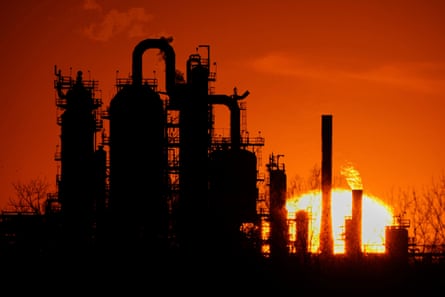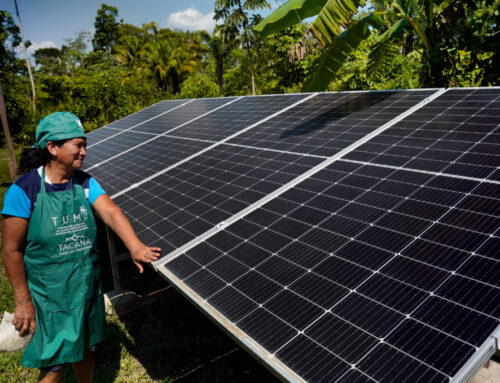‘Existential and urgent’: what impact will ICJ climate ruling have on Cop30?
November 9, 2025
In July 2025, the international court of justice delivered a landmark decision that clarified that all states were bound under international law to tackle the human-made climate crisis, which the judges unanimously concluded posed an “urgent and existential threat” to the planet’s life-sustaining systems and therefore humanity itself.
The ICJ advisory opinion built on rulings from hundreds of climate lawsuits across the world over the past decade or more, and added further legal weight to strong decisions from the inter-American court of human rights in July 2025 and the international tribunal on the law of the sea in May 2024.
But the ICJ case in particular, which brought the world’s biggest problem to the world’s highest court, has been hailed as a gamechanger for climate justice and accountability. It made clear that the established legal duty to do no harm, particularly transboundary environmental harm, was universal and not contingent on a country’s ratification or membership of formal treaties such as the Paris agreement, from which Donald Trump withdrew on his first day back in the White House.
On Monday, the first day of Cop30, 25 UN experts including the special rapporteurs on climate change, Indigenous peoples and eduction, are expected to release a joint statement calling for “full compliance” with the ICJ ruling, along with a ban on fossil fuel lobbyists and more transparency as crucial steps in acheiving just climate action.
“The credibility of the climate COP30 as a whole depends on achieving a meaningful outcome on mitigation and international financial and technological cooperation, with specific reference to fossil fuels and related subsidies as the main drivers of climate change and their impacts on human rights, including health, economic equality, adequate standard of living, education, and cultural rights.”
So what impact could or should the ICJ opinion have on the negotiations and domestic climate policies? Can international tribunals force governments to take the transformative action required to prevent catastrophe? Can the rulings help communities and countries already faced with devastating climate harms such as sea level rise, melting glaciers, deadly heatwaves and destructive superstorms such as Hurricane Melissa, which battered Jamaica in late October, obtain resources and remedies from polluters?
What climate action are states duty-bound to take?
The ICJ advisory opinion affirmed that all states had legal duties to act with due diligence to prevent, mitigate and remedy harms to the climate system. But the onus is on the industrialised wealthy countries that have contributed most to the crisis to act first. States must cooperate in good faith and in accordance with their common but differentiated responsibilities and (CBDR) capabilities – the central tenets of discussion, disagreement and delay over the past 30 years of UN climate summits.
Crucially, the judges rejected arguments from high polluting countries who opposed the ICJ case – including the US, UK, China, the EU, Russia and Saudi Arabia – that their obligations were limited to the consensus based climate regime, that is the UN framework convention on climate change, Kyoto protocol and Paris agreement.
Rather, the ICJ affirmed that every person had a human right to a “clean, healthy and sustainable” environment – a prerequisite for enjoying universal foundational rights such as life, health, food, water and housing.
As such, the legal duty to prevent climate catastrophe flows from the entirety of international law, including the UN charter and universal obligations under customary law that obliges all states to prevent serious transboundary harm to the environment and human rights from activities within its borders.
Could the ICJ ruling be the catalyst for policy change at Cop30?
On mitigation specifically, the ICJ ruling lifted 1.5C from an aspirational target to a definitive legal benchmark for which states could be held legally accountable. It requires countries to ensure their nationally determined contributions (NDC), their plans to reduce emissions under the Paris agreement that states were required to submit this year, reflect the “highest possible ambition”, and reflect CBDR.
But the Cop is a multilateral process where decisions are made by consensus, a fact that has allowed powerful countries to veto directly or block decisions they do not like by putting pressure on smaller states dependent on them for aid. Some big emitting states have attempted to discredit the ICJ ruling as radical and downplay its significance.
According to Jacob Werksman, the EU’s head of delegation, who was speaking in a personal capacity during a New York climate week event in September, the ICJ ruling could have a “chilling effect” – or no impact at all – on negotiations that should remain “laser focused on emissions reductions”.
Still, the majority of states and legal experts agree that this business-as-usual carbon tunnel position goes against the legality and spirit of all three international tribunal decisions, and will be increasingly subject to challenge in domestic and international courts.
Ralph Regenvanu, the climate minister of Vanuatu, which spearheaded the ICJ case, said: “Climate-vulnerable states have to be ready individually and collectively to rebut efforts by polluting states to dilute the ICJ advisory opinion in the public discourse. We need to continuously remind them that cooperation is a legal obligation, not charity or aid, and not fulfilling what was agreed in Paris – and at every Cop – is an internationally wrongful act.”
Expect Vanuatu and other small island states facing existential threats from the climate crisis and other fossil-fuel-related harms to speak out about the ICJ ruling throughout the summit. Many countries are likely to limit public comments for diplomatic reasons, but have been busy seeking legal advice on how the ICJ opinion can strengthen their position during closed-door negotiations on mitigation, adaptation and climate finance including loss and damage.

The F words: what about fossil fuels?
Oil, gas and coal expansion, emissions and profits have continued to break records since Cop28 in Dubai, when states agreed to phase down (not phase out) fossil fuels. This is perhaps unsurprising given the vast tentacles of industry interests – lobbyists, executives, financiers, PR and big tech – that wield influence in global politics and at Cop summits.
But the ICJ provided the boldest-ever language on fossil fuels, specifically spelling out the legal obligation by states to exercise “due diligence” in ending extraction, consumption, licences and subsidies – due to the mountain of unequivocal evidence on the harms caused to all life-supporting systems including climate, food, water and biodiversity.
The duty extends to an obligation to regulate private businesses responsible for emissions and other significant harms to the climate system operating within their borders, and that a state’s failure to regulate these greenhouse gas emissions and emitters constitutes an internationally wrongful act susceptible to legal consequences.
Elisa Morgera, the UN special rapporteur for climate change, said: “After the clarity of the ICJ advisory opinion, if we don’t have a meaningful decision on fossil fuels, then the [Cop] process cannot be considered legitimate any more.”
Still, the industry will probably be out in full force at Cop30, especially as the host, Brazil, recently slashed environmental regulations that open the door for more oil extraction in the Amazon. It’s worth watching for the inevitable industry sponsored misinformation and disinformation targeting the ICJ ruling, a playbook they have harnessed so successfully over decades to block and delay climate action.
What about support for countries already damaged by the climate crisis?

The ICJ ruling makes clear the obligation of rich global north states to rapidly phase out fossil fuels to avert further loss and damage, and to provide financial and technical support to global south states for adaptation to minimise harm and respond to the irreversible loss and damage. But while the inter-American court on human rights included a strong ruling on reparations, the ICJ did not.
It validates and supports claims for reparations for harm caused to life supporting climate systems by states and the corporations they are legally obliged to regulate, but leaves it up to individual communities or states to seek legal remedy through litigation.
Harnessing the ICJ ruling to demand climate justice will be a key role for activists in Belém, according to Harjeet Singh, an Indian climate activist, Cop veteran and strategic adviser to the fossil fuel non-proliferation treaty. “The ICJ advisory opinion is a lever to demand reparations and justice in a very different manner than what we have done in the past, but for that to happen we need to make it public opinion.
“Fossil fuel companies are responsible. Governments are not doing enough and they need to regulate and can be held libel for damages. That’s what international law says, and Cop30 is an opportunity for the climate justice movement, scientists and the media to build the public narrative around reparations for historical injustice. People on the street should know that the ICJ decision is there and their governments are not complying with the law.”
What didn’t the ICJ ruling do?
The decision skirted around accountability and climate finance, leaving it up to communities and individual states to prove (in court) that a state had breached international obligations. It did not lay out a more stringent framework of enforcement, or address the challenge posed by global heating to development for global south countries.
However, the ICJ advisory opinion is already starting to reshape domestic and transnational climate litigation, with claimants and courts from Canada to Brazil, Switzerland to South Korea, drawing on its reasoning, signalling a shift from legal theory to action.
Adam Weiss, chief programmes and impact officer at ClientEarth, said: “Right now, we live in a world where it’s possible to make a profit from digging up fossil fuels and burning them. That is absurd, and the ICJ told us that the international legal system cannot continue to make that possible.
“The three advisory opinions add to a growing body of jurisprudence that’s setting a new direction for law around the world. We’re at a legal tipping point … the law is going to be the power that forces us in the direction that we need to go.”
Search
RECENT PRESS RELEASES
Related Post




